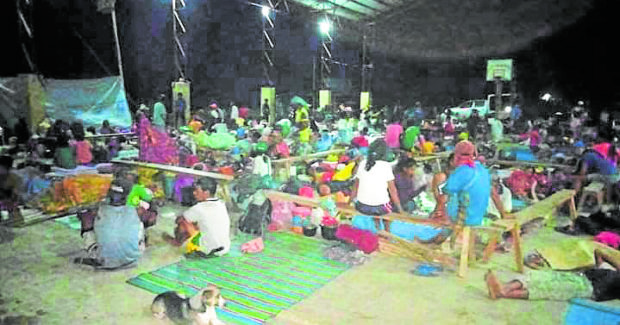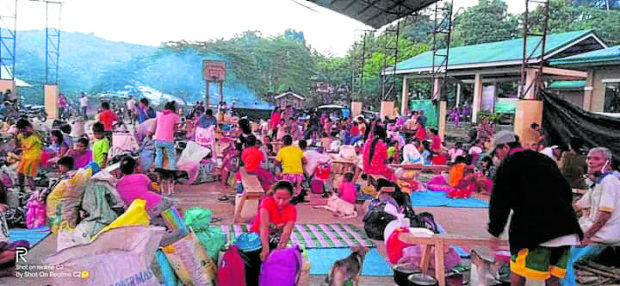Non-Moro tribes in Bangsamoro oppose BTA extension

SAFE GROUND Hundreds of residents of Barangay Kuya, South Upi, Maguindanao, fled to the town center in March after armed men arrived in their village to occupy their lands. —CONTRIBUTED PHOTOS
DAVAO CITY—A coalition of non-Moro indigenous peoples’ (IP) groups advocating the full inclusion of their rights in the Bangsamoro is opposing the proposal to extend the region’s governing transition body for another three years.
The coalition, which named itself Loyukan, the Teduray word for “comrade,” said it believed that the elections in the region should push through next year to “resolve the political authority and legitimacy” of the current Bangsamoro parliament.
“The last three years have diminished our confidence in the BTA (Bangsamoro Transition Authority) to deliver the full inclusion of the rights of the non-Moro indigenous peoples in the BARMM (Bangsamoro Autonomous Region in Muslim Mindanao) as articulated in the Bangsamoro Organic Law (BOL). So we call for the nonextension of the BTA,” said Timuay Labi Leticio Datuwata, supreme tribal chief of Timuay Justice and Governance (TJG), who led the coalition.
“The BTA should secure its democratic mandate by giving people the power to choose its own leaders,” Datuwata said in a statement on Sunday.
The BTA members, all appointed by President Duterte, have been seeking to extend their term, saying that their work, particularly on integrating former Moro fighters into mainstream communities, has been stalled by the coronavirus pandemic.
Article continues after this advertisementThe BOL provided for a three-year transition process within the Bangsamoro, with the region’s first regular election set during the May polls next year.
Article continues after this advertisementLand disputes
But Loyukan said a BTA extension could have ramifications for more than 127,000 non-Moro IP groups living in some 208,258-hectare ancestral domain that overlapped with the Bangsamoro territory.
The group also cited the spate of killings within the ancestral domain of the Teduray and Lambangian communities that started during the implementation of the BOL.
From July 2018 to July 2019, 11 non-Moro IP leaders and individuals were killed in Maguindanao province and another 11 killings were recorded since January this year, the statement said.
According to the group, the killings were related to land issues. “There are also reports of destruction of properties, harassment and violent attacks against the non-Moro IP communities, forcing families to flee from their ancestral domains,” the statement said.
As of July 2020, the United Nations High Commissioner for Refugees recorded 667 families and approximately 3,358 individuals displaced from the area and another 1,000 families displaced since January this year.
Elusive peace
Timuay Santos Unsad, representative of TJG of the Teduray and Lambangian tribe of Maguindanao, said non-Moro IP had fled their homes in Barangay Kuya and Barangay Itaw of South Upi, Maguindanao, after their communities were allegedly attacked by armed men.
In Barangay Macalag of Datu Unsay town, people fled fearing they would be hit in the crossfire as clashes between government troops and the Dawlah Islamiya continued. Villagers took refuge in Barangay Limpungo in Datu Hoffer town.
Datuwata said they had submitted reports on these cases to the BTA “but nothing has been done to address the worsening human rights situation of our people.”
“In the end, peace is nowhere to be found. We have long been witnesses to systemic violence and aggression … The barrel of the gun became the new form of power in these conflict areas,” he said.
